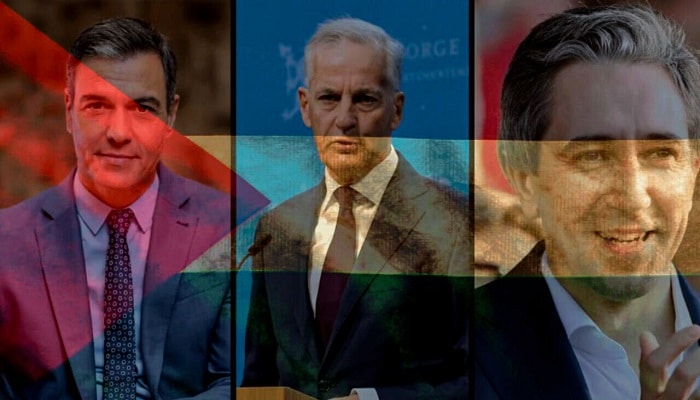PNN – The decision of the governments of Spain, Norway and Ireland to recognize the state of Palestine in response to the genocide of the Zionist regime in Gaza, although in the context of global reactions, is of historical, political and symbolic importance. But what is important is changing the current equations from paper to a reality that the people of occupied Palestine can benefit from.
“When the war in Gaza ends, citizens will realize that we have witnessed one of the darkest moments of the 21st century. When that happens, I want Spaniards to be satisfied that their government was on the right side of history.”
According to the report of Pakistan News Network, the words we read are one of the last comments made by Spanish Prime Minister Pedro Sanchez regarding the European country’s decision to recognize the state of Palestine. These days, Spain has assumed the role of European leadership and coordinates its partners for the recognition of the Palestinian state.
Spain, in coordination with Norway and Ireland, have set next Tuesday to recognize the state of Palestine. On the other hand, the Zionist regime has started retaliatory measures against the Palestinian Authority; From the decision to cancel the law of complete disconnection with the northern West Bank to the request of the Zionist ministers to Benjamin Netanyahu, the Prime Minister of the Zionist regime, to hold a meeting with the aim of approving the construction of 10,000 new residential units for the Zionist settlers.
Spain’s action should not only be considered as a fleeting emotion, but the recognition of the Palestinian state has been the country’s position since the Madrid Conference in 1991. In a situation where Europe has been accused of complicity in the crimes of the Zionist regime, the will of Spain has been welcomed by many, especially in the Arab world and the global south. Spain has succeeded in taking the role of this country in the leadership of Europe for the recognition of Palestine by leaving France behind.
However, taking into account that more than 220 days have passed since the Zionist regime’s war against Gaza and the international community has not been able to disable Israel’s killing machine, some questions are raised: At what level can the importance of the action of Spain and other European countries in recognizing Palestine be evaluated in the current situation? What is the importance of the recognition of Palestine for the people who are under the momentary bombardment of Israel? What are the details and features of the recognition of Palestine component and what other measures should it include in order to be effective in the field of action and change the equations on the ground? As the recognition of Palestine, along with the severance of diplomatic relations of some countries with Israel, the issuing of warrants for the arrest of officials of the Zionist regime, as well as the binding ruling of the International Court of Justice to stop the attacks of the Israeli regime on Rafah, in the context of a “diplomatic tsunami” (according to the term used by the Guardian against Israel, what is the impact and meaning of the actions of Spain and its European partners for America as Israel’s main ally?

The country of Palestine
El Mundo newspaper recently wrote in a report with the introduction that “the state of Palestine exists on paper, not on the ground”: On November 29, 1947, the United Nations General Assembly approved the UN plan for the partition of Palestine with a two-thirds majority vote. delivered On November 15, 1988, the Palestine Liberation Organization (PLO) declared the state of Palestine in an official meeting in Algeria. It was an era in which the occurrence of the first intifada in the occupied territories was its main feature. In this declaration, the annexation of the entire occupied territories to Palestine was emphasized, but this issue was never taken seriously by the occupiers.
The declaration of Palestinian independence ultimately led to a two-state solution and a peaceful solution to this dispute. The 1988 Declaration was recognized by more than half of the UN member states and laid the foundation for subsequent peace negotiations, culminating in the Madrid Conference in 1991 and the Oslo Accords in 1993.
Currently, 143 countries out of 193 UN members recognize the state of Palestine. 10 countries on this list are members of the European Union, the most prominent of which is Sweden, which recognized Palestine as a state in 2014. Malta, Cyprus and some Eastern European countries had recognized Palestine in 1988, before Palestine joined the European bloc, but they never implemented their decision.
In this way, after the first wave of recognition of Palestine at the end of the 1980s, since 2009, a second wave of countries (most of Latin America and Venezuela at the head of them) recognized the state of Palestine. Some countries, like France, were willing, but have never done this. Russia and China are currently the only permanent members of the UN Security Council that have recognized Palestine.
The recognition of the Palestinian state is an essential element in the implementation of historical justice for the people of this land
From the first comments of European Commission President Ursula von der Leyen in the first days of the conflict in full support of Israel and even her trip to the occupied territories to the announcement of the decision of the Spanish government and its European partners, nearly 36 thousand people have lost their lives in Gaza. After years of procrastination, Israel’s killing machine against Gaza in these more than 200 days caused the international community to turn its attention to the Palestinian issue.
The conditions under which the Palestinians have gained political status, or countries talk about the fact that Palestine should be recognized as an independent state, represent obstacles to the Israeli project.
In this way, the world’s interest in the Palestinian issue is not only very important, but it should not be underestimated in any way, especially in the current situation. The October 7 operation of the resistance fighters and after that, the attacks of the Zionist regime, made the world believe that the wound of Palestine must be healed. Healing the suffering of Palestine is of great importance both from the point of view of Israel’s interests, according to what the Western governments argue, and from the point of view of defending the rights of the Palestinian nation.
The recognition of the State of Palestine by European governments should be analyzed at the same time as criticism increases, especially from Western countries, in a situation where the level of support for Palestine and the discrediting of Israel has reached unprecedented levels. Recent developments in the international system against Israel and this level of hatred towards this regime in the atmosphere of public opinion and governments have been unprecedented.
Regardless of the political component of “recognition”, we must consider that the recognition of Palestine as a country is an essential element in the implementation of historical justice for the people of this land, which helps to achieve their inalienable right to self-determination.
The occupation of 1967 showed Israel’s determination to deny the possibility of forming an independent Palestinian state, and Europeans’ fruitless reliance on the two-state solution has been carried out in a situation where the expansion of settlements in the occupied territories makes the establishment of a Palestinian state more difficult every day. The Zionist occupation policy, which is considered a war crime according to international humanitarian law, showed how Tel Aviv, through its institutions, seeks to continue denying the right to self-determination of the Palestinians.

How should the state of Palestine be recognized?
The recognition of the state of Palestine must definitively end the dramatic scenarios of establishing the borders of this country through negotiations. It should not be forgotten that the borders of 1967 cannot be the subject of legal and political debate.
Israel’s occupation violates the binding norms of international law, including the right of Palestinians to self-determination and the prohibition of land acquisition through the use of force, the prohibition of imposing regimes of foreign subjugation, domination and exploitation, including racial discrimination and apartheid.
In this regard, the actions and violations of the Zionist regime should be stopped immediately and should not be negotiated. Recognizing a Palestinian state without explicitly recognizing the 1967 borders allows Israel to insist on negotiations while continuing its colonial project. Obviously, recognition by a significant number of countries gives Palestine more leverage in negotiations.
What does the recognition of Palestine mean for America?
On May 10, the day the UN General Assembly passed a resolution granting new “rights and privileges” to Palestine, US Secretary of State Anthony Blinken coincidentally had a bilateral meeting with his Spanish counterpart Jose Manuel Albarez in Washington. A meeting between the heads of the two governments, with a different position on how to continue the process of recognizing Palestine.
El Mundo newspaper wrote at that time: The Spanish government supported the resolution approved by the General Assembly to grant more rights to Palestine. Spain takes another step in support of Palestine while the United Nations Assembly showed the loneliness of America and Israel.

End of speech
The recognition of Palestine is an important step towards ending the Israeli occupation, which should be targeted in order to help find a political solution to this conflict. Obviously, no one should think that recognizing the borders of 1967 as the borders of the Palestinian state is a gift to this nation. Also, this action should not be used as a justification for shrugging off the legal obligations of the international community to take decisive measures against serious violations of international laws by Tel Aviv.
The Zionist regime will continue to build its settlements the day after the recognition of Palestine, and it is the duty of Spain and other countries to pay attention to the necessity of legal measures that lead to the end of the reality of Israel’s occupation, parallel to the recognition of Palestine.
The recognition of Palestine should lead to a political solution that will change the situation of Israel and Palestine vis-a-vis each other as occupying power and people under permanent occupation.
Many politicians, experts and international human rights organizations agree that this recognition is a key step towards consolidating the Palestinians’ fundamental right to self-determination. However, making sure that mere recognition on paper can help change the reality on the ground, when Palestinians and their land are faced with Israeli occupation, war, the destruction of their population, and the systematic elimination of their culture and even their way of life.
As 53-year-old veteran Palestinian journalist Wael Dahdouh previously told the Spanish Newspaper El Pais in response to the question, “After months of bombing, is mere rhetoric enough or not?” He said: It is clear that the people who live the daily life of war need more support and relief. Their needs are more than these. The attitude of the Spanish government in the midst of this brutal war has been welcomed by the Palestinians. We value Spain, as well as its efforts, along with other European governments, to follow through on their words, to apply more pressure and, now, for a ceasefire and for the Palestinians to regain their rights. We know this is a difficult task.

